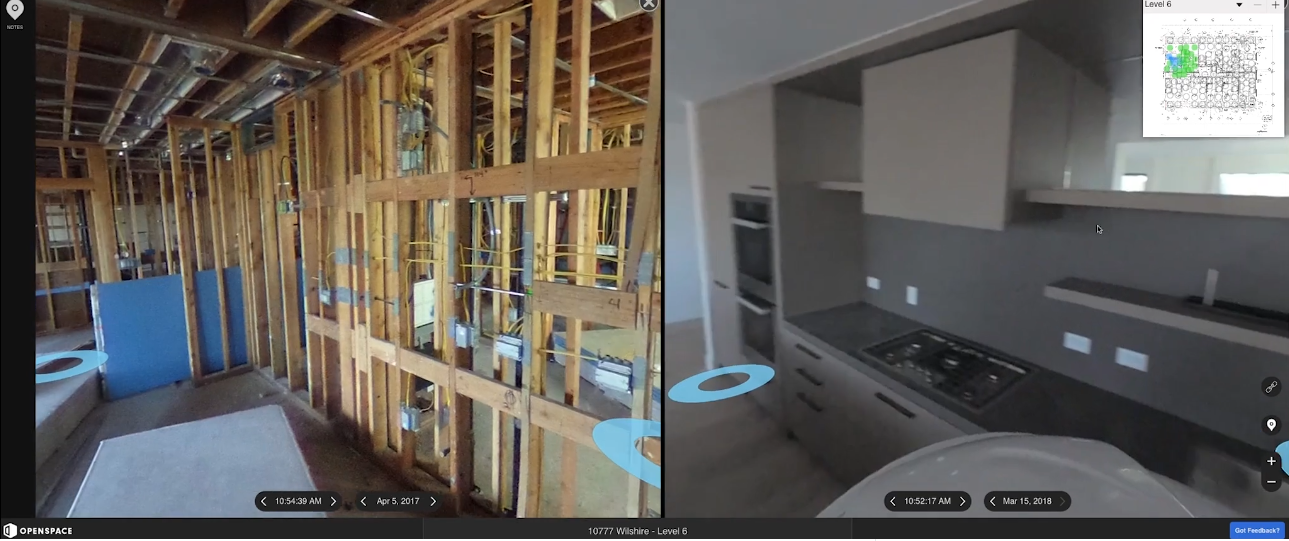Watch all the Transform 2020 sessions on-demand here.
The global construction market will be a $12 trillion industry by 2022, according to a recent Construction Intelligence Center (CIC) forecast. However, the sector is not renowned for its efficiency — various reports indicate that construction is among the lowest-performing industries in terms of productivity, a factor that can be attributed in part to the lack of digitization. And this is leading to a boom in investments aimed at technology startups that are looking to bring building sites into the 21st century.
The latest such startup to garner the attentions of venture capitalists is OpenSpace, a fledgling company that uses artificial intelligence (AI) to automatically create navigable 360-degree photos of construction sites. The company today announced that it has raised $14 million in a series A round of funding led by Lux Capital, with participation from some notable names from the real estate and construction realm, including WeWork, JLL Spark, Navitas Capital, Suffolk Construction, Tishman Speyer, and Zigg Capital. With its fresh cash injection and slew of strategic investors in place, OpenSpace said that it’s well positioned to scale its operations and develop new computer vision-powered tools.
How it works
OpenSpace’s software is compatible with the $800 Garmin VIRB 360 camera, which builders or site managers strap to their hard hats to document the development of a site as it evolves. OpenSpace captures all the imagery and uploads it to the cloud, where it taps computer vision and machine intelligence to organize the photos, stitch them together, and map them to project plans — all while automatically identifying objects such as windows and molding.

Above: Then and now: OpenSpace comparing how a construction job has progressed
There are a number of use cases for this technology, one being that it enables remote stakeholders to check on the progress through virtual site tours. But at its core, OpenSpace is all about keeping a digital record of projects as they progress, and presenting them in what OpenSpace calls “Google Street View-style documentation.” To use another somewhat crude analogy, it’s kind of like the Internet Archive’s Wayback Machine, but for construction projects. This evidence can then be used to resolve conflicts, or enable managers to track multiple projects remotely without being on site.
June 5th: The AI Audit in NYC
Join us next week in NYC to engage with top executive leaders, delving into strategies for auditing AI models to ensure fairness, optimal performance, and ethical compliance across diverse organizations. Secure your attendance for this exclusive invite-only event.
Founded in 2017, San Francisco-based OpenSpace said that it has been deployed on projects “exceeding $50 billion in total value” globally. Real estate developer and OpenSpace investor Tishman Speyer said that it has already piloted the technology on the MIRA building in San Francisco, as well as the Spiral — a 65-floor skyscraper in New York City.
“We see value in scaling this program more broadly,” noted Tishman Speyer managing director Jenny Wong. “Access to accurate, immediate data is essential in the development and building process, and we are excited to be partnering with OpenSpace.”
While improving efficiency is one key selling point of OpenSpace’s technology, it also fits into a broader trend that has seen AI increasingly infiltrate the construction and real estate sectors. Norwegian startup Spacemaker recently raised $25 million to grow its simulation software that automatically creates the structural layout designs for residential developments, allowing architects and designers to focus on the creative elements. Post-build, San Francisco-based Cape Analytics has raised sizable funding for a platform that meshes computer vision with geospatial imagery to help insurance companies evaluate properties.
“At OpenSpace, we’re using AI to augment workers’ capabilities by making documentation fast, easy and complete,” added OpenSpace CEO and cofounder Jeevan Kalanithi. “We started this company by collaborating with builders, on their job sites. We knew that any documentation solution needed to be totally passive in order to fit into the extremely busy day-to-day of a construction site, and this is what inspired us to create OpenSpace’s unique tap-and-go approach.”

